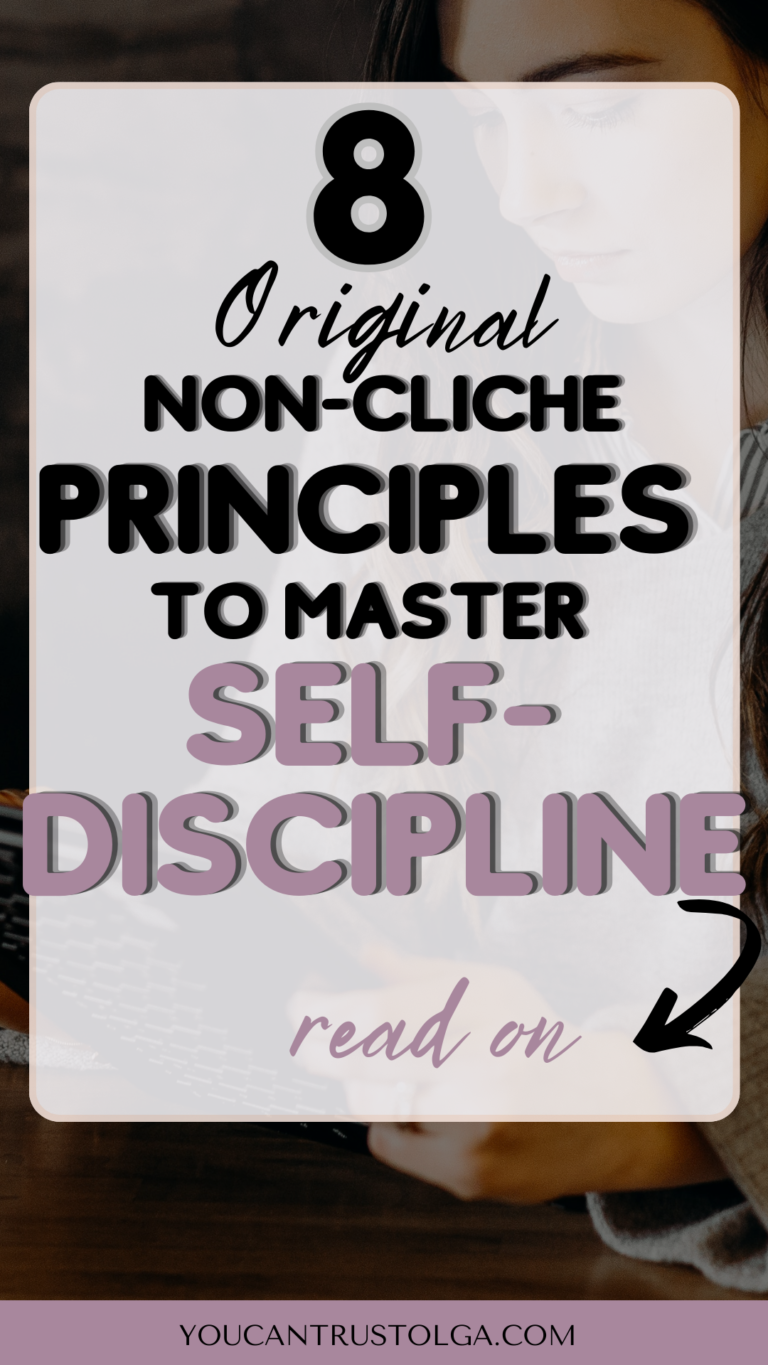If we take an unconventional angle on the subject of self-discipline we will discover a depth that goes beyond traditional understandings. It prompts us to ponder the essence of self-discipline, questioning why it has been praised as a virtue throughout history, why do we need it to begin with and when its application truly matters.
This exploration is more than a mere examination; it’s an invitation to challenge our preconceptions about self-disciplining and open ourselves to fresh insights. And for those of us who are fond of original, non-cliché ideas, this article will really be a delight.
So, let’s dive in!

congrats, you are at the right place!
The fact that you clicked on this article and ended up here signifies that the subject of self-discipline has already somehow crossed your mind.
Maybe… you’ve been struggling to wake up early and stick to a morning routine, always hitting snooze until you’re running late.
Maybe… you promised yourself you’d hit the gym three times a week, but somehow, Netflix and your couch keep winning the battle.
Maybe… you set a goal to save money, but every time you check your bank account, those little impulse purchases—coffee runs, online shopping, or eating out—are adding up faster than you expected.
Or maybe… you’ve been meaning to start that side hustle, write that book, or learn that new skill, but procrastination keeps sneaking in, and you keep telling yourself, “I’ll start tomorrow.”
Whatever it is, the fact that you’re here means you already recognize the need for more discipline in your life.
What's discipline and who are we without it?
Before learning how to build self-discipline, let’s make sure we understand the concept and its importance in our lives.
Discipline is the ability to control impulses, stay focused on long-term goals, and take consistent action—even when we don’t feel like it.
It’s what separates success from stagnation, progress from procrastination.
It’s about showing up for yourself, day after day, regardless of circumstances.
WITHOUT DISCIPLINE, WE ARE SLAVES TO OUR EMOTIONS AND IMPULSES.
We might have great ideas, dreams, and ambitions, but without the ability to follow through, they remain just that—dreams.
We feel stuck in our inconsistency, making excuses, yet knowing that we, in fact, could do better.
Life becomes a cycle of wishing and regretting, and giving in to short-term gratification at the expense of long-term success.
Sad way to live life – do you agree?

Now that we understand why self-discipline is essential, the next question is: How do we develop it?
To help you strengthen your self-discipline and take control of your life, here are 9 powerful steps to get you started.
1. where are you rushing to?
You would agree that life has recently become insanely fast. This high-speed world urges us to move, think, and act at the speed of light. Day in and day out we are cooking in the matrix of self-created to-dos, checking off boxes, only to discover that we are fast-forwarding life toward our own inevitable end.
SLOWING DOWN and taking your hands off the control is what you need to do first. PAUSING and suspending any activity is an opportunity for change you’ve been looking for. It is a getaway, a window, a new beginning, a vantage point to start all over again.
“But what does it have to do with self-discipline?” you may ask.
Well, read on…
There’s a good chance you might be heading in the wrong direction without realizing it. Do you truly know where you’re going with all these self-discipline ideas?
When life gets too busy and overwhelming, we often lose touch with reality and operate on autopilot. We then default to our habitual settings or following somebody else’s lead without conscious consideration.
To make these self-discipline projects really work, you must first take a step back and reassess.
2. WHO ARE YOU TRYING TO IMPRESS?
I know this monkey in your head never shuts up. So does mine.
It says many things, most of which contradict each other, and very little makes sense. This monkey served a purpose in our evolutionary past, aiming to protect us in a world where such protection is no longer necessary.
What is important to understand is that in this noise, there are ideas, beliefs, and principles that are not genuinely ours, but rather imposed on us.
And if we want to do the right thing, we have to sift through this mental chatter and discern which parts truly belong to us.

So, when you entertain the idea of self-discipline, ask yourself next questions:
“WHERE DID YOU GET THIS IDEA FROM?”
“WHY DO YOU WANT TO DISCIPLINE YOURSELF IN THIS PARTICULAR AREA?”
“WHAT IS GOING TO CHANGE IN YOUR LIFE IF YOU ACHIEVE THE RESULTS YOU WANT?”
and finally
“WHO ARE YOU DOING IT FOR?”
in other words,
“WHO ARE YOU TRYING TO IMPRESS?”
The reason we do all this preliminary “work” is to ensure that whatever self-discipline goals we have in mind – all of them are authentic, realistic, and come from a healthy place.
RELATED READING
3. are you paying attention?
In order to stay on your objectives you need to be focused. If you are easy to get distracted there is a danger of meandering around without a clear sense of direction, attempting a multitude of tasks but ultimately accomplishing none.
Let’s be honest, all your endeavors, including self-discipline, are out of the window when you have the attention span of a goldfish.
Of course, living in a highly digital day and age doesn’t help. However, while it’s easy to point fingers and place blame, the reality is that the choice is yours.
It is only up to you to decide if you want to spend hours scrolling through endless reels instead of hitting the gym or working on that project you’ve been procrastinating.
4. what the hell are you doing?
As cliche as it may sound, everyone is unique.
What may be effective for maintaining discipline in my life might not necessarily work for yours.
We all have distinct preferences, motivations, and ways of processing information.
Understanding and respecting these differences is crucial when seeking strategies for self-discipline.
Instead of relying on universal tricks, it’s important to experiment and discover what resonates with your personality, goals, and lifestyle. In other words, there is NO ONE-SIZE-FITS-ALL solution to discipline and you will need to carve your own custom approach.

5. feeling like a complete loser?
“People often say that motivation doesn't last. Well, neither does bathing – that's why we recommend it daily.”
Motivation isn’t a one-time achievement like a college diploma that you obtain and retain indefinitely. Instead, it’s more like a flame that requires continuous kindling. To keep that motivational fire burning, daily efforts of SELF-ENCOURAGEMENT become essential.
It involves:
- cultivating a mindset that embraces positive reinforcement
- setting small goals
- and acknowledging achievements regularly
(How Self-Compassion Can Transform Who You Are (Including 50+ Affirmations))
Motivation thrives on consistent, conscious efforts to fuel that inner drive, recognizing that it’s an ongoing process rather than a fixed state.
6. what do you believe?
Since the catalyst for change lies within your mind, ASSESSING YOUR COMMON BELIEFS related to self-discipline, motivation, and success is imperative. I bet you will find that many of them are not true, or at least don’t contribute to your growth. It is time to challenge them.
Here are some crucial insights for you. Read on!
Did you know that the absence of self-discipline is seldom indicative of laziness?
More frequently, the absence of self-discipline serves as a mask for underlying fears and insecurities. Procrastination and a struggle to stay disciplined often stem from a fear of failure, a fear of judgment, or a lack of confidence in one’s abilities. It’s a protective mechanism, a way to avoid facing potential challenges or uncertainties.
Do you recognize that perfectionism can be detrimental?
Shifting focus from an elusive quest for perfection to a mindset of CONTINUAL IMPROVEMENT is transformative. Embracing a “better something than nothing” mentality encourages taking meaningful steps forward, even if they are not flawless. It’s about adapting consistency, and acknowledging that progress is a series of steps rather than giant leaps.
Do you believe that endless comparison will make you less committed?
In the pursuit of self-improvement through self-discipline, it’s critical to MIND YOUR OWN BUSINESS and avoid the trap of constant comparison. The journey towards becoming a better version of yourself is uniquely yours, and progress is best measured against your own standards, not external benchmarks. Why would you care what others are doing anyway?
7. CAN'T WAIT TO GET IT OVER WITH?
When tackling tasks that feel tiresome or less enjoyable, like finishing a school project or staying consistent with exercise, consider approaching them with willingness and joy.
Instead of seeing them as burdens, turn them into a game or find a way to make them enjoyable. Since these tasks are a part of your life, why not choose to engage in them with a positive mindset?
Being present and mindful can aid in finding satisfaction IN THE PROCESS.
Slow down, immerse yourself in the task, and approach it with concentration and dedication. Rather than merely waiting for it to be over, playfully engage with the experience and live in the moment.
In other words, ACCEPT WHATEVER YOU DO AND DO IT WILLINGLY.
8. UNABLE TO TOLERATE DISCOMFORT?
Our tendency to avoid certain tasks stems from the negative emotions attached to them. Our brains strive to evade discomfort, especially if things seem unfamiliar. In other words, we avoid being uncomfortable.
Try an experiment: instead of resisting, try staying with the negative emotion, simply living through it. It's not as intimidating as it may seem; after all, it is just an emotion, much like a positive one.

Both positive and negative feelings are integral parts of our existence, and by denying “not-so-comfortable” ones we deprive ourselves a big part of it.
If you want to succeed and be disciplined you must learn to be comfortable while being uncomfortable.
9. do you have a routine?
A daily routine, especially a structured morning routine, is one of the most effective ways to build self-discipline.
A well-planned morning routine helps you gain control over your time, prioritize important tasks, and establish consistency in your habits.
Without a routine, it’s easy to fall into a REACTIVE MINDSET, where you’re constantly responding to distractions rather than focusing on what truly matters.
A productive morning routine eliminates decision fatigue. When you wake up knowing exactly what to do—whether it’s exercising, journaling, reading, or meditating—you don’t waste energy deciding how to start your day.
It strengthens your self-discipline because you’re training yourself to follow through on commitments, regardless of motivation.
Over time, this practice rewires your brain to prioritize consistency over short-term comfort, making it easier to resist distractions and stick to long-term goals.
let's conclude
Just keep in mind that in the journey of building self-discipline, consistency is key.
It’s not about making drastic changes overnight but about committing to small, intentional actions that compound over time.
You have to also understand that challenges and setbacks are inevitable, and get yourself mentally prepared for that.
Ultimately, self-discipline is not just about achieving success—it’s about becoming the best version of yourself, capable of overcoming distractions and staying committed to what truly matters.





